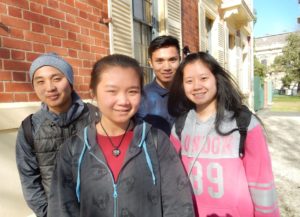Refugees add economic and social capital to regional communities – study
 The settlement of refugees at Bendigo, in central Victoria, has contributed economically and culturally to the life of the city while offering opportunities for employment and social participation to refugee communities, according to a new study today.
The settlement of refugees at Bendigo, in central Victoria, has contributed economically and culturally to the life of the city while offering opportunities for employment and social participation to refugee communities, according to a new study today.
The arrival of refugees has added almost $70 million to the local economy over a decade while also enhancing the city’s rich multicultural traditions.
Titled ‘Regional Futures: Economic and social impact of the Karen resettlement in Bendigo’, the report was produced jointly by Deloitte Access Economics and migrant and refugee settlement agency AMES Australia.
It set out to analyse the social and economic impact of Karen refugees settled in Bendigo over the past decade. Currently, around 1,000 Karen live in Bendigo. While this report focuses on the Karen, there are other significant cohorts of refugees living in Bendigo, including Sudanese and Afghans, and to whose presence in the city this report has relevance.
The report found that in net present value terms (NPV) over a ten year period, the total economic impact from the regional resettlement of the Karen population on the Bendigo economy is estimated to have been $67.1 million, with an associated impact of an extra 177 full-time-equivalent jobs.
It found that because of the youthful demographic profile of the Karen population, the Karen labour force will continue to grow over time, adding to the productive capacity of the region in years to come.
The report found the resettlement of the Karen in Bendigo has been sustained over a decade because of the region’s attractiveness as a settlement location for this community – and has progressively contributed to a more ethnically diverse Bendigo.
“This has impacted many aspects of Bendigo society, including an increase in social capital. Social capital has been directly linked to broader concepts such as social cohesion, democracy, economic wellbeing and sustainability,” the report said.
The Karen in Bendigo have experienced improved standards of living, including home ownership, and greater opportunities and career pathways for young people, the report said.
AMES Australia CEO Cath Scarth said the study showed there was potential for settling more refugees and migrants in regional Australia.
“Regional settlement of migrants and refugees is a topical and important component in the advancement of Australia’s migration strategies and, when well-facilitated, it can make a significant contribution to the economic as well as the cultural social fabric of regional communities,” Ms Scarth said.
Deloitte Access Economics partner David Rumbens said that in the right conditions, the positive economic impact of the regional settlement of refugees was clear.
“There are many regional communities faced with issues around ageing populations and labour shortages. This study shows that refugees, and migrants more generally, can play a role in securing the future prosperity of regional communities across Australia,” Mr Rumbens said.
Former refugee Nay Chee Aung, a case worker and interpreter in Bendigo, arrived in the city with his mother and brother several years ago after spending many years in a refugee camp on the Thai-Burma border.
The Karen community leader says his community have settled well in Bendigo and enjoy the city and its welcoming community.
“It is a wonderful city to live in. Everyone is friendly and there are so many people from so many backgrounds and fields of endeavour,” Nay Chee said.
Laurie Nowell
AMES Australia Senior Journalist












